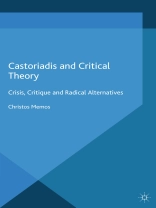By exploring the concepts of ‘crisis’ and ‘critique’, this study offers a thought-provoking re-examination of the political and social thought of Cornelius Castoriadis in light of the current world crisis and with regard to his radical critique of both the traditional Left and contemporary capitalist societies.
Table des matières
Introduction: Reading Castoriadis Politically 1 Origins: Early Years in Greece, Migration and Life in France 1.1 Formative years and the historicopolitical setting in Greece 1.2 Cultural milieu and intellectual influences 1.3 The peculiarity of Castoriadis’ migration 1.4 Castoriadis in France 2 The Critique of Totalitarianism 2.1 Castoriadis, Lefort and the questioning of Trotsky 2.2 An exchange of letters between Castoriadis and Pannekoek 2.3 ‘Union of Soviet Socialist Republics, USSR: Four Letters, Four Lies’ 2.4 Keeping the question open 3 Subversive Praxis, Open Crisis and Critique 3.1 Castoriadis, Arendt and the Hungarian Uprising of 1956 3.2 Castoriadis and the crisis of Marxism debate 3.3 Louis Althusser: ‘At Last the Crisis of Marxism has Exploded!’ 3.4 Castoriadis versus Althusser 4 Marx in Question 4.1 Castoriadis, Axelos and Papaioannou: Distinctiveness and the common basis of their critique of Marx 4.2 Castoriadis and Marx 4.3 The limits of Castoriadis’ critique 4.4 Freeingor freezing Marx? 5 The Crisis of Modern Societies and the Revival of Emancipatory Politics 5.1 Castoriadis and the crisis of May 1968 5.2 Crisis, reification and class struggle 5.3 Crisis and the odyssey of the project of autonomy 5.4 Towards a radical social transformation: Socialism, autonomy and revolution Conclusions Notes Bibliography Index
A propos de l’auteur
Christos Memos is a Lecturer in Sociology at the Department of Sociology, University of Abertay, UK. He has previously taught at the Department of Politics, University of York. His research interests include Critical Social and Political Theory, the Thought of Cornelius Castoriadis, Marx and Marxism, Council Communism and Anarchism, Social Movements and Anti-capitalism












